| Listing 1 - 10 of 30 | << page >> |
Sort by
|
Book
ISBN: 0201847582 Year: 1998 Publisher: Reading, Mass. Addison-Wesley
Abstract | Keywords | Export | Availability | Bookmark
 Loading...
Loading...Choose an application
- Reference Manager
- EndNote
- RefWorks (Direct export to RefWorks)
Operational research. Game theory --- Game theory --- Decision making --- Deciding --- Decision (Psychology) --- Decision analysis --- Decision processes --- Making decisions --- Management --- Management decisions --- Choice (Psychology) --- Problem solving --- Games, Theory of --- Theory of games --- Mathematical models --- Mathematics --- Game theory. --- Decision making.

ISBN: 9041196838 Year: 1998 Publisher: London : Kluwer law international,
Abstract | Keywords | Export | Availability | Bookmark
 Loading...
Loading...Choose an application
- Reference Manager
- EndNote
- RefWorks (Direct export to RefWorks)
341.17 EUR --- 261 Europees Recht --- Legislation --- -Decision making --- -341.2422 --- Ue3 --- Deciding --- Decision (Psychology) --- Decision analysis --- Decision processes --- Making decisions --- Management --- Management decisions --- Choice (Psychology) --- Problem solving --- Legislative process --- Law --- Legislative power --- Decision making --- European Union countries --- -EU countries --- Euroland --- Europe --- Politics and government --- International unification. --- -Politics and government --- International unification --- 341.2422
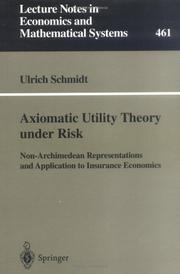
ISBN: 3540643192 3642588778 Year: 1998 Publisher: Berlin Springer
Abstract | Keywords | Export | Availability | Bookmark
 Loading...
Loading...Choose an application
- Reference Manager
- EndNote
- RefWorks (Direct export to RefWorks)
The first attempts to develop a utility theory for choice situations under risk were undertaken by Cramer (1728) and Bernoulli (1738). Considering the famous St. Petersburg Paradox! - a lottery with an infinite expected monetary value -Bernoulli (1738, p. 209) observed that most people would not spend a significant amount of money to engage in that gamble. To account for this observation, Bernoulli (1738, pp. 199-201) proposed that the expected monetary value has to be replaced by the expected utility ("moral expectation") as the relevant criterion for decision making under risk. However, Bernoulli's 2 argument and particularly his choice of a logarithmic utility function seem to be rather arbitrary since they are based entirely on intuitively 3 appealing examples. Not until two centuries later, did von Neumann and Morgenstern (1947) prove that if the preferences of the decision maker satisfy cer tain assumptions they can be represented by the expected value of a real-valued utility function defined on the set of consequences. Despite the identical mathematical form of expected utility, the theory of von Neumann and Morgenstern and Bernoulli's approach have, however, IFor comprehensive discussions of this paradox cf. Menger (1934), Samuelson (1960), (1977), Shapley (1977a), Aumann (1977), Jorland (1987), and Zabell (1987). 2Cramer (1728, p. 212), on the other hand, proposed that the utility of an amount of money is given by the square root of this amount.
Insurance --- Risk management --- Utility theory. --- Mathematical models. --- Actuarial mathematics --- Economic theory. --- Operations research. --- Decision making. --- Economic Theory/Quantitative Economics/Mathematical Methods. --- Operations Research/Decision Theory. --- Deciding --- Decision (Psychology) --- Decision analysis --- Decision processes --- Making decisions --- Management --- Management decisions --- Choice (Psychology) --- Problem solving --- Operational analysis --- Operational research --- Industrial engineering --- Management science --- Research --- System theory --- Economic theory --- Political economy --- Social sciences --- Economic man --- Decision making
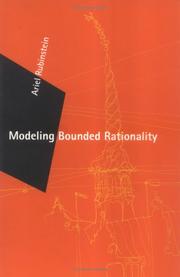
ISBN: 0262681005 0262181878 9780262681001 0262282755 0585053472 9780262282758 9780585053479 9780262181877 Year: 1998 Publisher: Chichester: Wiley,
Abstract | Keywords | Export | Availability | Bookmark
 Loading...
Loading...Choose an application
- Reference Manager
- EndNote
- RefWorks (Direct export to RefWorks)
Operational research. Game theory --- Economics --- Decision Making --- Economic man --- Game theory --- Rational expectations (Economic theory) --- Decision making. --- Economic man. --- Game theory. --- 519.8 --- Operational research --- Rational expectations (Economic theory). --- 519.8 Operational research --- Decision making --- Expectations, Rational (Economic theory) --- Economic forecasting --- Time and economic reactions --- Uncertainty --- Games, Theory of --- Theory of games --- Mathematical models --- Mathematics --- Homo oeconomicus --- Human beings --- Self-interest --- Deciding --- Decision (Psychology) --- Decision analysis --- Decision processes --- Making decisions --- Management --- Management decisions --- Choice (Psychology) --- Problem solving --- Business & Economics --- Management Theory
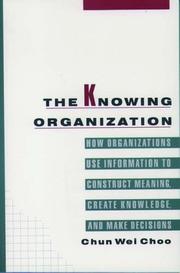
ISBN: 0195110129 0195110129 0195110110 9780195110128 Year: 1998 Publisher: New York (N.Y.) : Oxford university press,
Abstract | Keywords | Export | Availability | Bookmark
 Loading...
Loading...Choose an application
- Reference Manager
- EndNote
- RefWorks (Direct export to RefWorks)
Sociology of organization --- Communication in organizations --- Decision Making --- Knowledge, Sociology of --- Decision making --- Connaissance émotionnelle Emotional knowledge --- Culture d'organisation Organisatiecultuur --- Gestion des connaissances Kennisbeheer --- Information (gestion) Informatie (management) --- Organisation en apprentissage Lerende organisatie --- Prise de décision Beslissen --- Knowledge, Theory of (Sociology) --- Sociology of knowledge --- Communication --- Knowledge, Theory of --- Public opinion --- Sociology --- Social epistemology --- Deciding --- Decision (Psychology) --- Decision analysis --- Decision processes --- Making decisions --- Management --- Management decisions --- Choice (Psychology) --- Problem solving --- Organizational communication --- Organization --- Communication in organizations. --- Decision making. --- Knowledge, Sociology of.
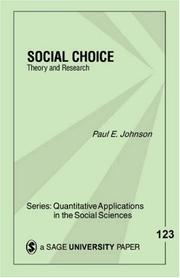
ISSN: 0149192X ISBN: 0761914064 1412985846 1452214433 0585181071 9780761914068 9781452214436 9781412985840 9780585181073 Year: 1998 Volume: 123 Publisher: Thousand Oaks, [Calif.] ; London : SAGE,
Abstract | Keywords | Export | Availability | Bookmark
 Loading...
Loading...Choose an application
- Reference Manager
- EndNote
- RefWorks (Direct export to RefWorks)
'Social Choice' is a comprehensive exploration of the key questions, concepts, terminology, methods and results of social choice theory.
Sociological theories --- Social choice --- Decision making --- Economic Theory --- Business & Economics --- Mathematical models --- #SBIB:303H10 --- -Decision making --- -Deciding --- Decision (Psychology) --- Decision analysis --- Decision processes --- Making decisions --- Management --- Management decisions --- Choice (Psychology) --- Problem solving --- Choice, Social --- Collective choice --- Public choice --- Social psychology --- Welfare economics --- Methoden en technieken: algemene handboeken en reeksen --- Mathematical models. --- -Methoden en technieken: algemene handboeken en reeksen --- Decision Making --- Social choice - Mathematical models --- Decision Making - Mathematical models
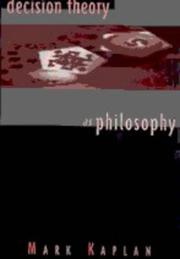
ISBN: 0521475058 0521624967 0511804849 Year: 1998 Publisher: Cambridge : Cambridge university press,
Abstract | Keywords | Export | Availability | Bookmark
 Loading...
Loading...Choose an application
- Reference Manager
- EndNote
- RefWorks (Direct export to RefWorks)
Is Bayesian decision theory a panacea for many of the problems in epistemology and the philosophy of science, or is it philosophical snake-oil? For years a debate had been waged amongst specialists regarding the import and legitimacy of this body of theory. Mark Kaplan had written the first accessible and non-technical book to address this controversy. Introducing a new variant on Bayesian decision theory the author offers a compelling case that, while no panacea, decision theory does in fact have the most profound consequences for the way in which philosophers think about inquiry, criticism and rational belief. The new variant on Bayesian theory is presented in such a way that a non-specialist will be able to understand it. The book also offers new solutions to some classic paradoxes. It focuses on the intuitive motivations of the Bayesian approach to epistemology and addresses the philosophical worries to which it has given rise.
Decision making --- Knowledge, Theory of. --- Science --- Prise de décision --- Théorie de la connaissance --- Sciences --- Philosophy. --- Philosophie --- Knowledge, Theory of --- -Decision making --- Deciding --- Decision (Psychology) --- Decision analysis --- Decision processes --- Making decisions --- Management --- Management decisions --- Choice (Psychology) --- Problem solving --- Natural science --- Science of science --- Epistemology --- Theory of knowledge --- Philosophy --- Psychology --- Prise de décision --- Théorie de la connaissance --- Normal science --- Philosophy of science --- Arts and Humanities --- Decision making.
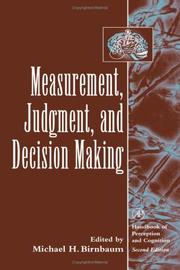
ISBN: 0120999757 9786611118884 1281118885 008053600X 9780120999750 9780080536002 9781281118882 6611118888 Year: 1998 Publisher: San Diego : Academic Press,
Abstract | Keywords | Export | Availability | Bookmark
 Loading...
Loading...Choose an application
- Reference Manager
- EndNote
- RefWorks (Direct export to RefWorks)
Measurement, Judgment, and Decision Making provides an excellent introduction to measurement, which is one of the most basic issues of the science of psychology and the key to science. Written by leading researchers, the book covers measurement, psychophysical scaling, multidimensional scaling, stimulus categorization, and behavioral decision making. Each chapter provides a useful handbook summary and unlocks the door for a scholar who desires entry to that field.Any psychologist who manipulates an independent variable that affects a psychological construct or who uses a numerical d
Psychometrics. --- Decision making --- Psychométrie --- Prise de décision --- #PBIB:2000.2 --- Psychometrics --- Measurement, Mental --- Measurement, Psychological --- Psychological measurement --- Psychological scaling --- Psychological statistics --- Psychology --- Psychometry (Psychophysics) --- Scaling, Psychological --- Psychological tests --- Scaling (Social sciences) --- Measurement --- Scaling --- Methodology --- Methoden en technieken --- meettheorie --- meettheorie. --- Psychométrie --- Prise de décision --- Decision making. --- Categorization (Psychology) --- Multidimensional scaling. --- Classification (Psychology) --- Abstraction --- Deciding --- Decision (Psychology) --- Decision analysis --- Decision processes --- Making decisions --- Management --- Management decisions --- Choice (Psychology) --- Problem solving
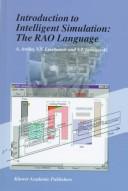
ISBN: 0792381769 9780792381761 1461376149 1461557097 Year: 1998 Publisher: Boston: Kluwer Academic Publishers,
Abstract | Keywords | Export | Availability | Bookmark
 Loading...
Loading...Choose an application
- Reference Manager
- EndNote
- RefWorks (Direct export to RefWorks)
Introduction to Intelligent Simulation of Complex Discrete Systems and Processes: RAO Language focuses on a unique approach in modeling and simulation of complex systems. In this volume are considered features of complex systems and processes, their mathematical description, and modeling. Theoretical foundations of the RAO (Resource-Action-Operation) language as well as its syntax and utilisation are given. Examples of simulation models of different complexity levels, related to different fields, are also presented. The RAO intelligent modeling system, introduced and described in Introduction to Intelligent Simulation of Complex Discrete Systems and Processes is unique because: (1) it makes simulation modeling universal for the classes of systems and processes modeled; (2) it is simple to modify the models; and (3) it has the capacity to model complex control systems together with the object controlled (including simulation modeling for on-line control). The RAO tool allows the user to use a language very similar to his professional language and rids him of intermediary, supplementary description of the system modeled. In fifteen chapters this volume provides an overview of general modeling trends, and hence serves the research community in guiding their modeling methods; intelligent simulation modeling is introduced to solve complex systems and processes.
Computer simulation --- Management --- Business & Economics --- Management Theory --- Engineering & Applied Sciences --- Computer Science --- Computer simulation. --- Operations research. --- Decision making. --- Production management. --- Operations Research/Decision Theory. --- Operations Management. --- Operational analysis --- Operational research --- Industrial engineering --- Management science --- Research --- System theory --- Manufacturing management --- Industrial management --- Deciding --- Decision (Psychology) --- Decision analysis --- Decision processes --- Making decisions --- Management decisions --- Choice (Psychology) --- Problem solving --- Decision making --- Computer modeling --- Computer models --- Modeling, Computer --- Models, Computer --- Simulation, Computer --- Electromechanical analogies --- Mathematical models --- Simulation methods --- Model-integrated computing

ISBN: 0792349008 1441947876 1475728859 9780792349006 Year: 1998 Volume: 12 Publisher: Boston (Mass.) : Kluwer academic,
Abstract | Keywords | Export | Availability | Bookmark
 Loading...
Loading...Choose an application
- Reference Manager
- EndNote
- RefWorks (Direct export to RefWorks)
This book provides a new point of view on the subject of business failure prediction, through the application of multicriteria analysis methods. The aim of the book is to provide a review of the research in the area and to explore the adequacy of these methods to one of the most complex problems in the area of financial management. In addition, the book explores the applications of the methods so that it can become a very useful tool for researchers and practitioners. The analysis of the modeling and the results in these applications provides the background for further employment of the methods.
Bankruptcy --- Business failures --- Forecasting. --- Finance. --- Operations research. --- Decision making. --- Management science. --- Finance, general. --- Operations Research/Decision Theory. --- Operations Research, Management Science. --- Quantitative business analysis --- Management --- Problem solving --- Operations research --- Statistical decision --- Deciding --- Decision (Psychology) --- Decision analysis --- Decision processes --- Making decisions --- Management decisions --- Choice (Psychology) --- Operational analysis --- Operational research --- Industrial engineering --- Management science --- Research --- System theory --- Funding --- Funds --- Economics --- Currency question --- Decision making --- Cessio bonorum --- Insolvency --- Privileged debts --- Commercial law --- Debt --- Law and legislation --- Bankruptcy - Forecasting. --- Business failures - Forecasting.
| Listing 1 - 10 of 30 | << page >> |
Sort by
|

 Search
Search Feedback
Feedback About UniCat
About UniCat  Help
Help News
News